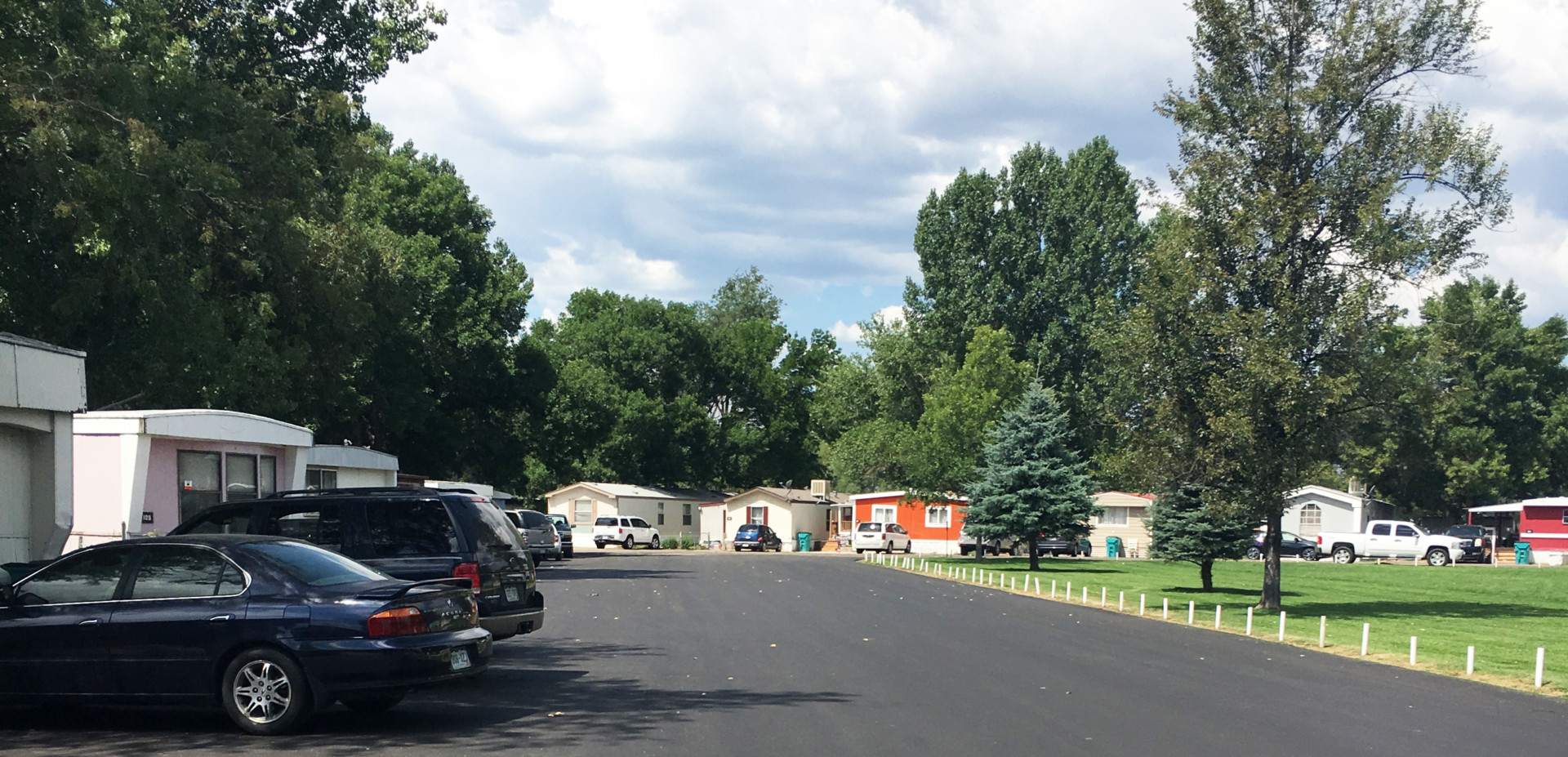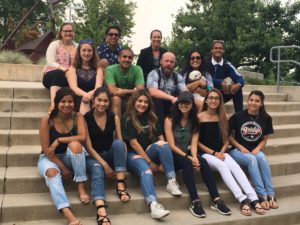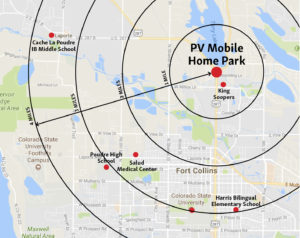
Inside the Poudre Valley Mobile Home Park, there are no sidewalks, which makes it challenging for residents to bike and walk safely. Photo: Karina Gonzalez
When you ask Colorado State University students what they did over the summer, the answers will run the gamut from spending time outdoors, working at a new job or just hanging out. A small group of CSU undergraduates, many of them incoming freshmen, had a unique experience in Fort Collins as part of the 2017 Community Sustainability Workshop. The class aims to get undergraduates more involved in solving real-world problems.
Jen Platero, a freshman studying journalism, was part of a team that looked at how residents in the Alta Vista neighborhood in north Fort Collins could more easily access natural areas. Monica Solis, a freshman in the Department of Human Development and Family Studies, conducted door-to-door surveys of residents in the Poudre Valley Mobile Home Park, located north of the city, to learn more about their interest in walking and biking more.
Other student teams conducted surveys to help figure out how Fort Collins can reduce food waste and discussed how to better integrate health and wellness into a community.

Paul Hellmund, an instructor in the School of Global Environmental Sustainability, came up with the idea for the new class. He’d previously worked on a similar course, which he described as “deeply immersive experiential learning,” at another university.
The class is structured to address community issues including sustainability, access to transportation, education, health services and more, Hellmund said.
“In our community, we have young people with a lot of passion, and a desire to make a difference in the world,” he said. “And, as instructors, we’d like to know how can we be more impactful in our teaching.”
Hellmund teamed up with Kristie Yelenik, instructor in the Department of English, for the class, which included a communications component. Students learned how to write an email in the professional world and how to conduct interviews, with help from staff at the Career Center at CSU.
Four projects
At the end of July, students presented their work on the four projects to the public. They fielded questions and received feedback from an expert panel that included CSU alumnus Jacob Castillo, economic development manager and enterprise zone administrator with Larimer County Workforce Center; Selina Lujan, assistant coordinator of the Healthy Homes Program for the City of Fort Collins; and Jeff Lakey, urban designer and landscape architect with LLG International, and a former CSU professor.
‘Students are a huge part of our community’
Selina Lujan is the assistant program coordinator for the Fort Collins’s Healthy Homes program, which helps educate people about indoor air quality. She’s also a CSU student, and will graduate in May 2018 with a master’s degree in social work.
Lujan helped review students’ Community Sustainability Workshop presentations at a public event in late July 2017. “I was extremely impressed with the course curriculum,” she said. “I wish a class like this was an option when I was an undergrad.”
The Fort Collins native, who has an undergraduate degree from the University of Colorado Boulder, has a keen interest in expanding public participation in city-led projects. This includes hearing from students and seeking opportunities to collaborate.
“Students are a huge part of our community,” Lujan said. “And if they stay here after graduation, they’ll be even more a part of the community.”
Lujan said she was “really proud” of CSU for creating this type of class.
“Everybody has a different perspective and background,” she said. “It was cool to see something in action right now, and students get to say, ‘Hey, I was a part of that, I helped put forward recommendations.’ Their efforts come full circle in a beneficial way.”
Chris Johnson, executive director of Bike Fort Collins, said the students he worked with exceeded his expectations.
“They did a great job,” he said. “They were in the neighborhood every day, knocking on doors, and asking questions. I’m amazed we got as much done as we did.”
 Solis and Karina Gonzalez completed at least 70 interviews with residents from the mobile home park. By conducting a walking audit and using public transportation, they saw how residents didn’t have a safe way of entering or exiting the park without a vehicle. The students found a short cut that residents were using to get into the mobile home park, but it wasn’t an option for the elderly, or for people using wheelchairs or strollers.
Solis and Karina Gonzalez completed at least 70 interviews with residents from the mobile home park. By conducting a walking audit and using public transportation, they saw how residents didn’t have a safe way of entering or exiting the park without a vehicle. The students found a short cut that residents were using to get into the mobile home park, but it wasn’t an option for the elderly, or for people using wheelchairs or strollers.
Inside the mobile home park, there are also no sidewalks, said Karina Gonzalez, a freshman studying political science.
“During the walking audit, we noticed children playing in the middle of the road,” Solis added. “Cars don’t have anywhere to park, which means there was no area for people to walk closer to the homes.” Some of the speed bumps were cracked, which is dangerous for people who are biking or in a wheelchair.
“Field work is so important to programs like this,” Johnson said. “When you do sustainability work, it needs to include direct community engagement. We are in much better shape than we had been if we didn’t have the CSU students’ involvement.”
Bike Fort Collins plans to analyze the data the students gathered and will sit down with members of the community to discuss recommendations for improving bicycling and walking options. One idea that came out of the students’ research is to form a community board.
Would Johnson team up with CSU students again?
“Absolutely,” he said. “I was thrilled with the students’ work.”